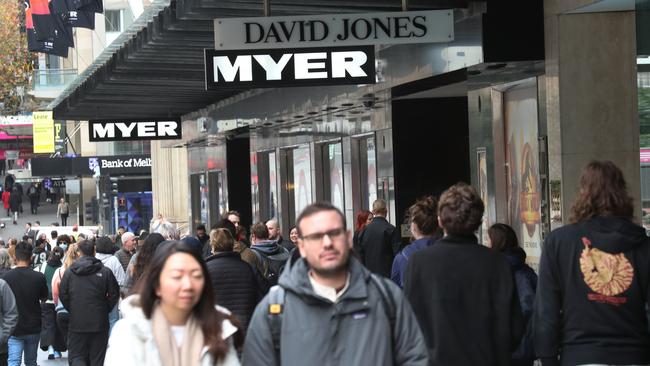Price pinch for shoppers hard to avoid: Deloitte
The rapid increase in retail prices will peak and moderate after December – but shoppers will face average rises of 1.9 per cent every year until 2025, new modelling shows.

The rapid increase in retail prices will peak and moderate after December – but shoppers will face average rises of 1.9 per cent every year until 2025, Deloitte says.
The consultancy’s quarterly sector report, released on Monday, shows retail sales have come out of the pandemic in a strong position, but spending is forecast to slow in the second half of the year and retailers face a shift to “value” purchases, shrinking margins and rising costs.
The Deloitte Access Economics figures show double digit sales growth is expected for apparel, catered food and department stores over 2022 – compared with locked-down 2021 – delivering an overall real retail sales increase of 5.5 per cent over the year.
“Inflation is now a cold, hard reality, to the extent that the majority of turnover growth over the next few years is expected to be driven by prices rather than volumes,” said Deloitte partner David Rumbens, the principal author of the report.
“For households, the price pinch is near unavoidable, with CPI price growth for non-discretionary goods and services up 6.6 per cent, more than double that of discretionary, which was up 2.7 per cent,” he said. “These non-discretionary goods and services are the ones households are less likely to reduce their consumption of, including food, fuel, housing and health, placing significant pressure on other components of spending.
Retail price growth is forecast to peak at 5.5 per cent over the year to December, with food retail prices up 7.6 per cent over the same period, Deloitte forecasts.
Already, some retailers are warning of tougher times ahead. Fashion retailer Universal Stores last week said it was facing a one-third slide in its full-year earnings, although the company added that it was pleased with momentum in its sales.
In a note to clients on Tuesday, Barrenjoey Capital Partners said it had made significant earnings cuts to discretionary retailers. Most at risk were JB Hi-Fi and Kogan, Barrenjoey’s Tom Kierath said. Despite shoppers stashing away funds during the Covid lockdowns, that reservoir of savings – estimated to be as high as $450bn – could be quickly soaked up by the rising cost of living, which is forecast to jump 13 per cent in 2023, Mr Kierath said.
Since its last update, Deloitte has upgraded its projections for the financial year, and says it expects to show a real sales growth of 2.8 per cent, up from 2.2 per cent. “The March quarter … was slightly stronger than previously predicted, with Omicron having less of an impact on spending levels and demand retaining momentum after an already strong 2021,” Mr Rumbens wrote. When it comes to inflation, there are some initial signs of encouragement.
“Shipping costs are back to levels seen this time last year and the reopening of some Chinese cities should ease disruptions to manufacturing and trade. Most notably, the Reserve Bank is looking to actively suppress price growth through a sequence of interest rate rises.”








To join the conversation, please log in. Don't have an account? Register
Join the conversation, you are commenting as Logout